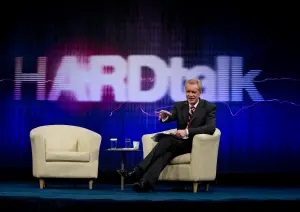Serj Tankian, the frontman of the famous Armenian-American heavy metal band System of a Down, publicly criticized Imagine Dragons for their planned concert in Baku, Azerbaijan, on September 2, 2023, which the band ultimately proceeded with. The controversy resurfaced after a July Rolling Stone interview with Imagine Dragons’ frontman, Dan Reynolds, in which he defended their decision to perform in Baku.
Tankian’s initial criticism in 2023 was in response to the humanitarian crisis in the former Republic of Artsakh (Nagorno-Karabakh), where the Azerbaijani government engaged in ethnic cleansing by blockading 120,000 Artsakh residents, including children and the elderly, leaving them without food, medicine, internet, electricity, and gas during harsh winter conditions.
Following the 10-month blockade, Azerbaijan forcibly displaced the Artsakh Armenians and took control of the region, leading over 100,000 people to flee their ancestral homeland. For the first time in over 2,000 years, Artsakh had no Armenian population.
The situation remains dire, with many international organizations, such as the Lemkin Institute for Genocide Prevention and Human Rights Watch, speaking out in support of the Armenian population.
Imagine Dragons, a globally successful pop-rock band with over 74 billion streams, multiple platinum records, and numerous music awards, including a Grammy, faced pressure from Tankian to reconsider their performance.
In his original public message on Instagram in 2023, Tankian expressed his belief that the band was likely unaware that Azerbaijan’s petro-oligarchic dictatorship was starving 120,000 people in Nagorno-Karabagh, a situation that former International Criminal Court prosecutor Luis Moreno Ocampo described as genocide.
Tankian mentioned that he tried to reach out to Imagine Dragons through their representatives, sending a polite letter urging them to reconsider performing in Azerbaijan, as it would help improve the dictatorial regime’s image. He even included several informative articles, including one from Amnesty International.
Tankian noted that the band had previously worked with Amnesty International, as they headlined Amnesty’s 2014 “Bringing Human Rights Home” concert in New York. Amnesty International has been a vocal critic of Azerbaijan and its president, Ilham Aliyev, highlighting the blockade, the lack of press freedom, and other human rights abuses.
When Imagine Dragons did not respond to Tankian’s letter, he took his concerns public, writing:
“As the humanitarian crisis in Nagorno-Karabagh worsens, with starvation already occurring, I feel compelled to publicize this letter and their disregard for this catastrophe. Maybe they felt legally obligated to play the show, or maybe they just don’t care. I’ve spent my life advocating for genocide recognition and believe that genocidal regimes or deniers must face consequences. Another genocide is looming in Azerbaijan, and while this happens, they enjoy an American band from LV. F**k that! That’s not right. Go to my profile to sign a petition to the band on change.org if you care to sign, and you can see my letter to the band on my Facebook page. Thanks for reading. Serj”
The petition referenced by Tankian has garnered 19,421 signatures but was ignored by Imagine Dragons, who went ahead with their planned concert.
In an interview with Metal Hammer magazine, Tankian expressed his reluctance to tell other bands where they should or shouldn’t play but felt compelled to draw the line when it comes to governments committing ethnic cleansing. He criticized Imagine Dragons, saying that if he had known about Azerbaijan starving 120,000 Armenians in Nagorno-Karabakh, there was no way he could have played the show. He added that he has “zero respect for those guys” for playing in Baku and emphasized that his stance wasn’t about ego but about making a positive impact.
Tankian continued:
“I wanted them to know that what they were about to do would have negative consequences. I was warning them for their own sake, for their own morality. I’ve been cautioning organizations against using Azerbaijan as a venue because if they’re allowed international connections that legitimize them, they’ll continue their bad behavior. If a dictator committing ethnic cleansing gets more contracts, Formula 1 races, and rock shows, he’ll think it’s okay to kill people. That’s not okay. We need to break that link and make people aware.”
On July 2 this year, Rolling Stone released an interview with Reynolds, asking him about the widespread criticism Imagine Dragons faced for their concerts in Azerbaijan and Israel. Reynolds defended their decision, saying he doesn’t believe in depriving fans who want to see them perform because of the actions of their leaders and governments. He described it as “a really slippery slope,” noting that there are corrupt leaders and warmongers everywhere, and questioned where to draw the line.
When Rolling Stone asked Reynolds about Tankian’s statement that he didn’t “respect them as human beings” for performing in Azerbaijan, Reynolds reiterated his stance: “I think I just said it. It’s a slippery slope, and I’m never going to deprive our fans of playing for them.”
It’s worth noting that Imagine Dragons canceled their shows in Kiev and Moscow, posting a now-deleted image of the Ukrainian flag on Instagram with the caption, “In light of recent events, we’re sad to announce our Russia and Ukraine shows are canceled until further notice. Our thoughts are with Ukraine and all others suffering from this needless war.”
The band has also taken on the role of ambassadors for the humanitarian organization UNITED24, a Ukrainian government-run fundraising platform for the Russo-Ukrainian War. They’ve worked alongside Ukraine’s First Lady, Olena Zelenska, to raise funds for ambulance supplies.
In a statement, Reynolds said, “We love the people of Ukraine and want to help in any way possible. Injustices like this can only be conquered when people around the world come together. We stand by the beautiful people of Ukraine and their courageous leader, President Zelensky. We will work with UNITED24 and local leaders to find ways to raise awareness and funds for the people until this unjust war ends. We look forward to the day when we can play a concert again in Kyiv and celebrate freedom, life, and music with the resilient and strong people of Ukraine.”
The band even removed their discography from the Russian market. However, this “slippery slope” that Reynolds mentioned seems to be selectively applied. While he champions the idea of people coming together to fight injustices in Ukraine, that same principle doesn’t seem relevant — or is portrayed as precarious or unfair — in other global situations.
Tankian quickly responded to Reynolds’ Rolling Stone interview on July 5 via social media, writing:
“Dan Reynolds said: ‘I don’t believe in depriving our fans who want to see us play because of the acts of their leaders and their governments. I think that’s a really slippery slope. I think the second you start to do that, there are corrupt leaders and warmongers all over the world, and where do you draw the line?’
Respectfully, I draw the line at ethnic cleansing and genocide. Azerbaijan’s dictatorship, with popular support, was already into a 9-month starvation blockade of Nagorno-Karabagh, qualified as genocide by former @icc prosecutor @luismorenoocampo when they decided to play Baku. Would they have played in Nazi Germany? Why don’t they want to play in Russia? Because it’s not popular?
They support Ukraine but not the Armenians of Artsakh? The only ‘slippery slope’ here is the false moral equivalency at the core of this hypocritical stance. I have nothing against Dan or his band. I just hate seeing artists being used to whitewash genocidal regimes.”
Reynolds and other members of Imagine Dragons have not responded to Tankian’s statement, but it’s clear where their priorities lie. While they publicly denounce their Russian fans (arguably “depriving” them of their music, in Reynolds’ words) and passionately support Ukraine with fundraisers and other efforts, the same logic doesn’t apply to the situation in Azerbaijan, Artsakh, and Armenia.
Rolling Stone Australia covered Tankian’s response to Reynolds’ interview on July 8. According to the article, a representative for Imagine Dragons did not immediately respond to the magazine’s request for comment.
Whether the band will eventually address Tankian’s concerns — in line with their activism for Ukraine — remains to be seen, but this public debate within the music industry has undoubtedly shed light on the responsibilities artists have in the face of human rights abuses.



